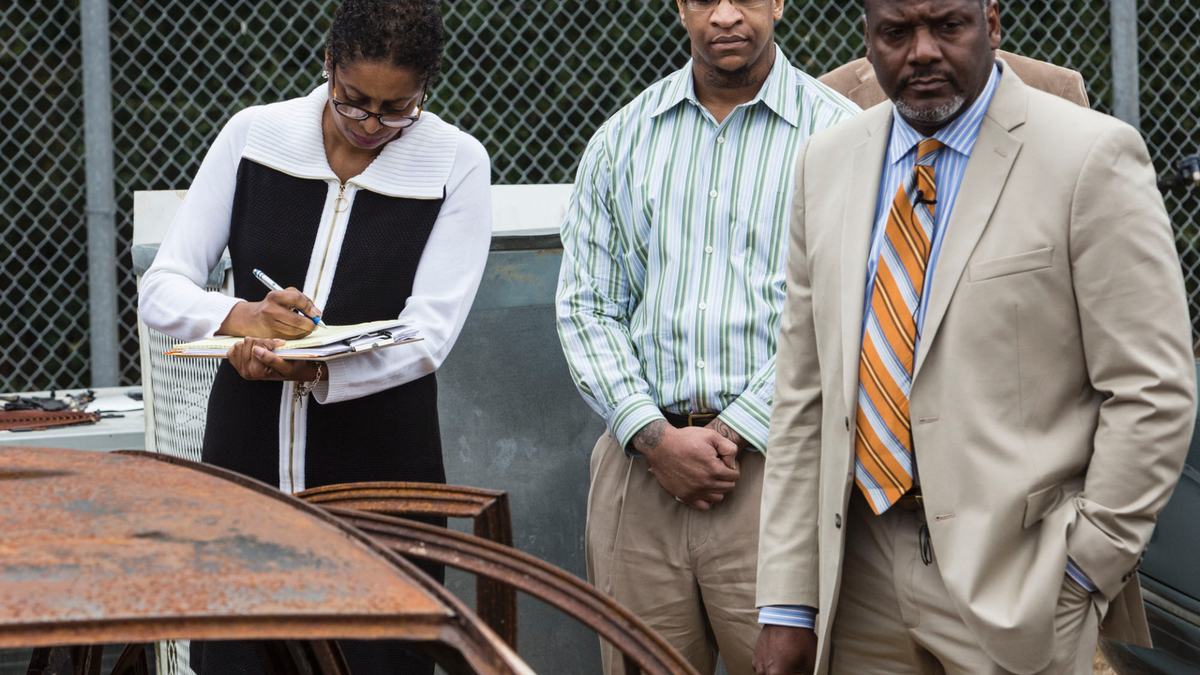
FILE - In this Oct. 12, 2017 photograph, Quinton Tellis, center, stands with his defense attorneys Darla Palmer, left, and Alton Peterson, right, near the remains of Jessica Chambers car in Batesville, Miss. Tellis was charged with burning 19-year-old Jessica Chambers to death. The trial ended in a mistrial, but Tells is to be retried in Chambers' burning death, starting Tuesday, Sept. 25. (Brad Vest/The Commercial Appeal via AP, Pool, FILE)
JACKSON, Miss. – Was it Quinton or Eric?
That's likely to be the choice again facing Mississippi jurors this week in the trial of Quinton Tellis, accused of setting 19-year-old Jessica Chambers on fire in her car in December 2014, only to see the dying woman stagger down a rural backroad and be found by firefighters.
The horrific circumstances surrounding the former high school cheerleader's death focused national attention on the victim's hometown of Courtland, a hamlet about 60 miles (100 kilometers) south of Memphis, Tennessee. In a trial last year, jurors couldn't agree whether Tellis was guilty of capital murder. The 29-year-old Tellis faces life in prison without parole if convicted.
He faces another murder indictment in Louisiana, in the torture death of Meing-Chen Hsiao, a 34-year-old Taiwanese graduate student at the University of Louisiana at Monroe. No trial date has been set in that case.
The Mississippi case is freighted with racial overtones because Tellis is black, while Chambers was white.
Chambers had burns on more than 90 percent of her body and one of the firefighters who found her described her as looking like a "zombie." The defense continues to focus on testimony by firefighters and other first responders who say they heard a badly injured Chambers tell them that "Eric" or maybe "Derek" had attacked her before she was whisked away to a Memphis, Tennessee, hospital where she died hours later.
"If we had one person saying she said 'Quinton set me on fire,' we wouldn't be having a trial," defense attorney Alton Peterson told The Associated Press. "But we had nine who said Eric did and we're having a second trial."
Witnesses for the government suggested in the first trial that Chambers, who had burns down her throat, was so injured and in shock that she may not have been able to properly pronounce words. A speech pathologist may be called in the second trial to emphasize that point.
Prosecutors point to cellphone records that show Chambers and Tellis were together twice on the day she was burned. The second time, prosecutors say Chambers picked up Tellis about two-and-a-half hours before she was found burned and they went to a fast food outlet.
Tellis originally told investigators he wasn't with Chambers on the evening of Dec. 6, but two years later changed his story and admitted he was.
Citing statements Tellis made to investigators, Panola County District Attorney John Champion said Tellis and Chambers had sex in her car later that evening. Champion said he believes Tellis suffocated Chambers and thought he had killed her. The defense, though denies that Tellis and Chambers had sex.
The prosecution's theory is likely to be much the same in the second trial.
"We're going to stick to what we believe is our strongest case and we put that on last time," Champion said.
But there's one new wrinkle. Prosecutors have subpoenaed a woman named Sherry Flowers as a witness. Peterson said she's expected to testify that she gave a man a ride the night of Chambers' death. This could fill in a crucial gap linking Tellis to the crime scene. In the first trial, prosecutors had claimed Tellis traveled on foot from the place where he left Chambers to his sister's house, got his sister's car, collected a can of gasoline at his own house, and then returned to set the car and an unconscious Chambers on fire.
Defense attorneys, though, question whether Flowers can identify Tellis as the man she transported.
"She indicates she's seen his face somewhere, but can't remember where," Peterson said.
Peterson also said the defense is likely to do more to challenge prosecution witnesses on cellphone locations and on whether Tellis' DNA was found on Chambers keychain in a ditch between the crime scene and the sister's house.
Jurors are scheduled to be selected Monday in the college town of Starkville and brought to the Panola County courthouse in Batesville for the trial. Jurors will be sequestered, and both sides expect the trial will run at least into the next weekend. Peterson said the second trial could be longer than the first and that the defense could call first responder witnesses that the prosecution doesn't call, in order to drive home the Eric question.
"Our position remains the same," Peterson said. "He didn't commit this crime, someone else did, and she told them who did it. They just didn't do a good job of finding him."
___
Follow Jeff Amy on Twitter at http://twitter.com/jeffamy . Read his work at https://www.apnews.com/search/By%20Jeff%20Amy .





















